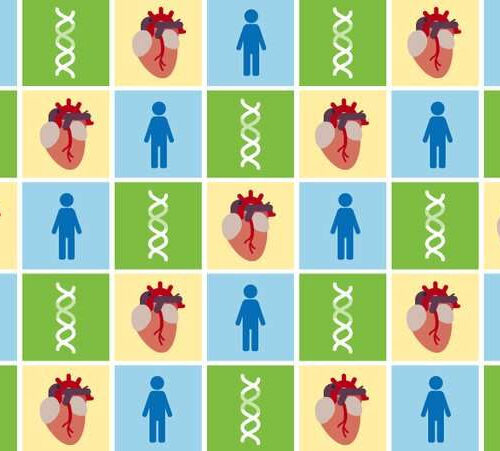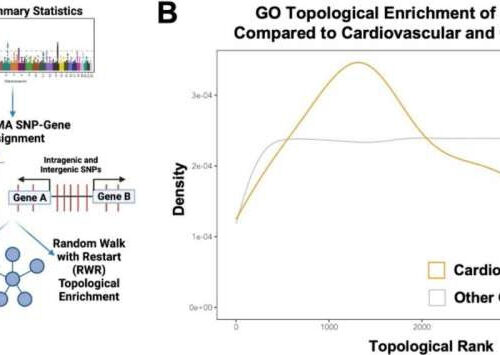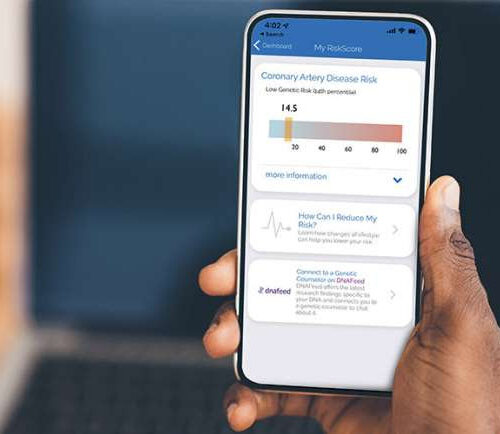by University of Exeter Credit: CC0 Public DomainYoung people could be spared from going blind by a new genetic risk tool that could also help diagnose multiple sclerosis (MS) earlier, to start effective treatments. Optic neuritis is a condition that affects people of all ages, but especially young adults, usually manifesting in blurred vision and sometimes...
Tag: <span>Genetic risk</span>
Genetic risk prediction for ten chronic diseases moves closer to the clinic
by Broad Institute of MIT and Harvard Credit: CC0 Public DomainBy analyzing millions of small genetic differences across a person’s genome, researchers can calculate a polygenic risk score to estimate someone’s lifetime odds of developing a certain disease. Over the past decade, scientists have developed these risk scores for dozens of diseases, including heart disease, kidney...
More diverse datasets lead to better genetic risk prediction for heart disease
by Leah Eisenstadt, Broad Institute of MIT and Harvard Credit: Susanna Hamilton, Broad Communications Over the past decade, researchers have been developing polygenic scores—calculations of a person’s likelihood of getting a disease based on the millions of small genetic differences across their genome. The accuracy of these scores has improved for some diseases and groups of...
UNIQUE GENETIC RISK FOR ALZHEIMER’S FOR ASHKENAZI JEWS
Alzheimer disease (AD), the most common neurodegenerative disorder in the world, affects individuals of all races and ethnicities; however, most genetic research for AD has been performed on individuals of European ancestry (EA) with a limited number of large-scale genetic studies in other populations. For many centuries, Ashkenazi Jews lived in communities in Eastern Europe and were...
139 genetic risk loci associated with varicose veins identified
by Bob Yirka, Medical Xpress Random Walk with Restart-based Topological Gene Enrichment of Genome-wide Significant Varicose Veins Variants. a) Workflow of cell-type specific SNP-to-gene assignment and gene set enrichment analysis. Hi-C contact maps were generated from human umbilical vein endothelial cells (HUVECs) and human coronary artery smooth muscle cells (HCASMCs) and the intersecting H-MAGMA assigned...
Genetic risk scores help predict type 2 diabetes in people of south Asian origin
by Public Library of Science Researchers from Queen Mary University find that genetic risk scores help predict type 2 diabetes in people of south Asian origin. Credit: Genes & Health Research Team, Queen Mary University (CC-BY 4.0, https://creativecommons.org/licenses/by/4.0/) Combining a genetic risk score with a clinical risk score improved the prediction of type 2 diabetes in British...
Newly developed genetic risk scores could help patients, physicians make health decisions
by Brigham and Women’s Hospital Credit: Unsplash/CC0 Public Domain A person’s risk of developing diseases such as type 2 diabetes or breast cancer may be influenced by thousands of genetic differences. Looking at a single DNA difference that has a small effect on risk may not be clinically useful, but when hundreds or thousands of...
Research team develops a smartphone app to calculate genetic risk for heart attack
by The Scripps Research Institute Scientists at the Scripps Research Translational Institute developed the MyGeneRank mobile app that can provide study participants with their unique genetic risk score for coronary artery disease. Credit: Scripps Research A Scripps Research team has developed a smartphone app that can calculate users’ genetic risk for coronary artery disease (CAD)—and...
COVID-19 genetic risk variant protects against HIV
by Max Planck Society DNA analytics in the lab. Credit: Max Planck Institute for Evolutionary Anthropology The genetic variants we are born with can increase or decrease our risk of falling seriously ill with COVID-19. The major genetic risk variant for severe COVID-19, one we inherited from Neandertals, is surprisingly common. This raises the question...
Study: Personal genetic risk motivates positive changes in health behavior
by University of Helsinki Credit: Unsplash/CC0 Public Domain A new study from the University of Helsinki shows that information about personal genetic risk for cardiovascular disease motivates individuals to take better care of their health. This is the first comprehensive study assessing the impact of overall disease risk information based on both genetic and traditional...
- 1
- 2









